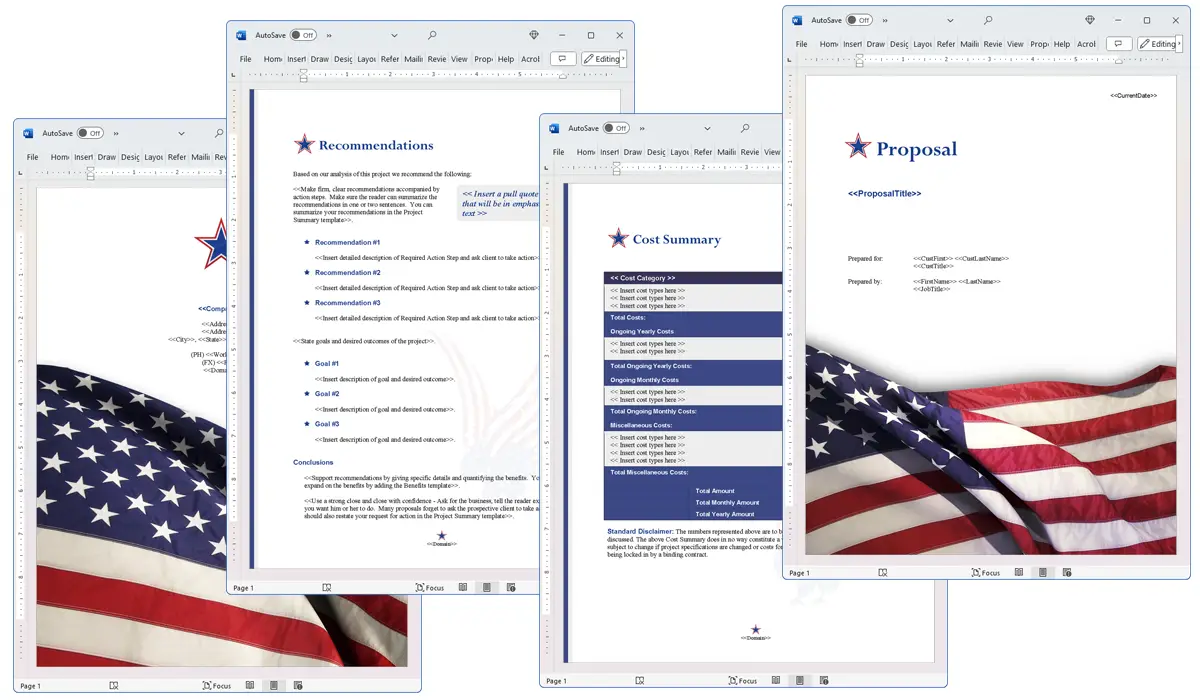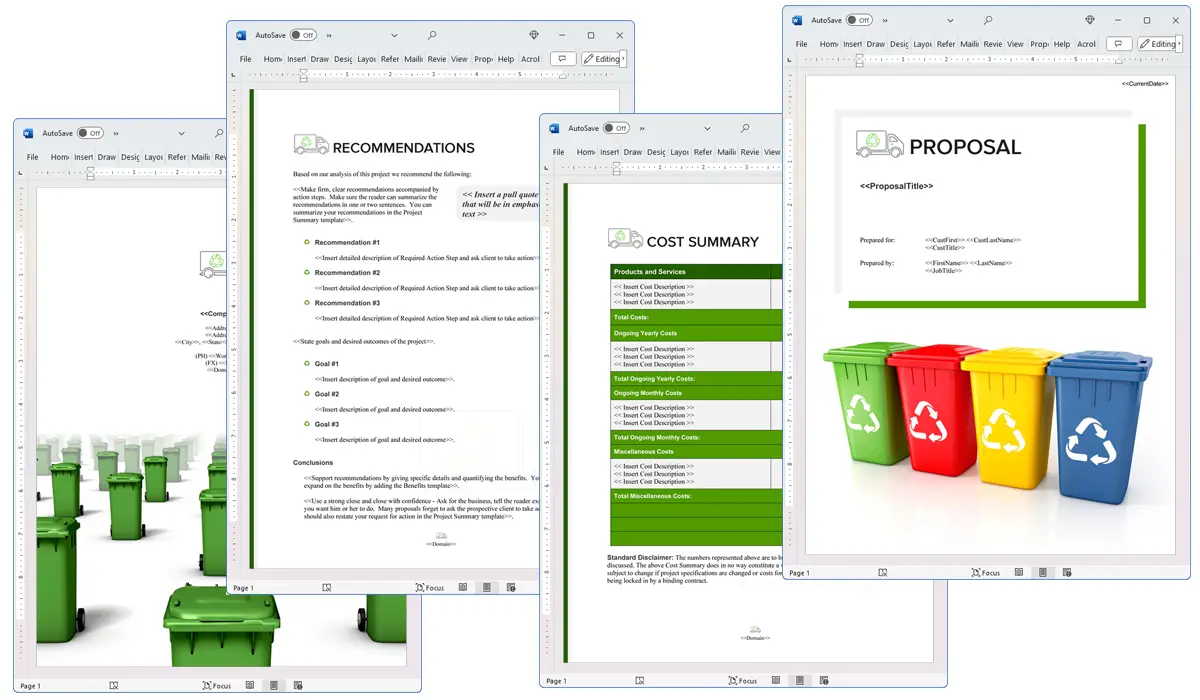What is the Asset Relocation chapter used for?
Proposal Kit Professional Bundle adds more design themes, all six Contract Packs,
a project management library, and Expert Edition software.

Illustration of Proposal Pack Flag #6
We include this Asset Relocation chapter template in every Proposal Pack, along with thousands more. You assemble this chapter with others in various combinations to create custom-tailored business proposals, plans, reports, and other documents. Proposal Packs apply custom visual designs to the templates, giving the final documents a consistent professional finish.
 DOWNLOADABLE, ONE-TIME COST, NO SUBSCRIPTION FEES
DOWNLOADABLE, ONE-TIME COST, NO SUBSCRIPTION FEES
Overview of the Asset Relocation Chapter
When preparing a custom proposal document, the Asset Relocation chapter serves an important role in outlining the logistics and rationale behind moving assets from one location to another. This could involve physical assets like equipment, or intangible assets such as intellectual property and investments. The focus of this chapter is to introduce the necessity or desirability of such moves, helping stakeholders understand the importance of asset relocation withconsidering the situation of the overarching proposal.
How is the Asset Relocation Chapter Used?
In a business proposal, the Asset Relocation chapter is used to clearly communicate the plans and procedures for transferring assets. This section of the proposal makes the case for why relocating these assets is beneficial and necessary for achieving business objectives, such as operational efficiency, compliance with new regulations, or capitalizing on opportunities. It sets the stage for stakeholders to agree on the methods and timelines proposed for the relocation process.
What is Included in the Asset Relocation Chapter?
Typically, the Asset Relocation chapter includes:
- Introduction to Relocation: Why the relocation of assets is necessary or advantageous.
- Types of Assets: Detailed description of the different assets to be relocated, categorizing them as physical, financial, or intellectual.
- Relocation Plan: Step-by-step plan on how the assets will be moved, including timelines, responsible parties, and logistical details.
- Risk Management: Potential risks involved in transporting the assets and the strategies to mitigate these risks.
- Expected Outcomes: Benefits or improvements anticipated as a result of the asset relocation.
Use Case Examples for the Asset Relocation Chapter
- Corporate Restructuring: When a company decides to consolidate operations, the Asset Relocation chapter can outline how equipment and technologies will be moved to new locations.
- Mergers and Acquisitions: In the case of a merger, this chapter can detail how assets from both companies will be combined or redistributed.
- Compliance with Regulations: If new laws require certain assets to be stored or used in specific locations, this chapter can explain how the move will comply with those regulations.
- Strategic Expansion: For businesses expanding into new markets, this chapter can describe how assets will be relocated to support new operations.
- Disaster Recovery: In situations of disaster recovery, the Asset Relocation chapter can outline plans for moving critical assets to secure locations.
Key Takeaways
- The Asset Relocation chapter is important for explaining the need and logistical plans for moving assets.
- It covers types of assets, reasons for relocation, and detailed plans for asset transfer.
- This chapter is crucial in proposals related to corporate restructuring, compliance, or expansion.
- It helps stakeholders understand the implications and benefits of asset relocation.
- Properly outlining asset relocation can mitigate risks and ensure smoother transitions during business changes.

Illustration of Proposal Pack Painter #3
 What Our Clients Say
What Our Clients SayAs a freelance web designer contracts and proposals were always tricky. Proposal Kit has helped making these items much easier to manage and create."
 4.7 stars, based on 845 reviews
4.7 stars, based on 845 reviewsRelated Chapters
Document Layouts Using the Asset Relocation Chapter

The Asset Relocation chapter and other chapters are integrated into a Word document as illustrated here in the Proposal Pack Sanitation #1 design theme. There are hundreds of design themes available, and every design theme includes the Asset Relocation chapter template.
A proper business proposal will include multiple chapters. This chapter is just one of many you can build into your proposal. We include the complete fill-in-the-blank template in our Proposal Pack template collections. We also include a library of sample proposals illustrating how companies in different industries, both large and small, have written proposals using our Proposal Packs. This template will show you how to write the Asset Relocation.
We include a chapter library for you to build from based on your needs. All proposals are different and have different needs and goals. Pick the chapters from our collection and organize them as needed for your proposal.
Using the Proposal Pack template library, you can create any business proposal, report, study, plan, or document.
 Ian Lauder has been helping businesses write their proposals and contracts for two decades. Ian is the owner and founder of Proposal Kit, one of the original sources of business proposal and contract software products started in 1997.
Ian Lauder has been helping businesses write their proposals and contracts for two decades. Ian is the owner and founder of Proposal Kit, one of the original sources of business proposal and contract software products started in 1997.By Ian Lauder
 Published by Proposal Kit, Inc.
Published by Proposal Kit, Inc.


 Cart
Cart
 Facebook
Facebook YouTube
YouTube X
X Search Site
Search Site